T20 World Cup: What England must do ahead of their next T20 campaign in 2022
This article contains affiliate links. We may earn a small commission on items purchased through this article, but that does not affect our editorial judgement.
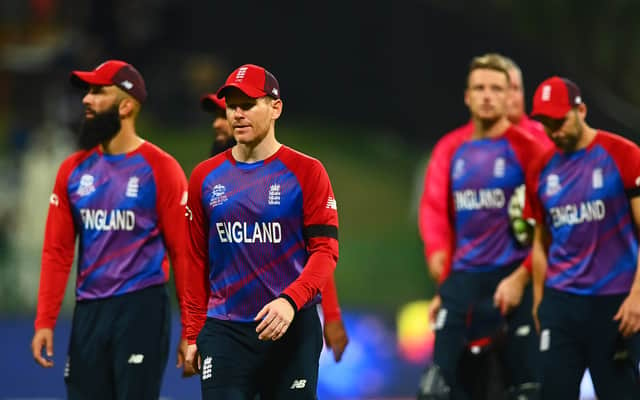

Eoin Morgan’s side started the competition in a dominating position, winning their first four games including brutal defeats over the West Indies and Australia.
However their luck soon began to fade as Tymal Mills and Jason Roy were both ruled out with injuries ahead of the final group match and semi final.
Advertisement
Hide AdAdvertisement
Hide AdEngland’s luck then went from bad to worse as New Zealand were able to avenge their 2019 World Cup final and beat England by five wickets to make Sunday’s final in Dubai.
New Zealand will play Australia in the final, and England must ponder on what they can do ahead of the next T20 World Cup which takes place in 2022 in Australia.
What happened in the England v New Zealand semi final?
England’s Jos Buttler and Jonny Bairstow opened the batting in the absence of Roy. Yorkshire’s Bairstow struggled to 13 off 17 balls before being caught by Captain Kane Williamson.
The current superstar of the England squad, Buttler looked unsettled in his 29 off 24 and was out leg before wicket of Ish Sodhi.
Advertisement
Hide AdAdvertisement
Hide AdIn came Dawid Malan and Moeen Ali who sprung some life into the scorecard. Malan who is the current number two ranked T20 batsman in the world, hit 41 off 30 before being caught by Devon Conway off Tim Southee.
In came Livingstone who continued to partner Indian Premier League winner Ali as he hit smacked 51 off 37. The Hundred’s highest scoring batsman, Livingstone, hit a brief 17 before he too fell.
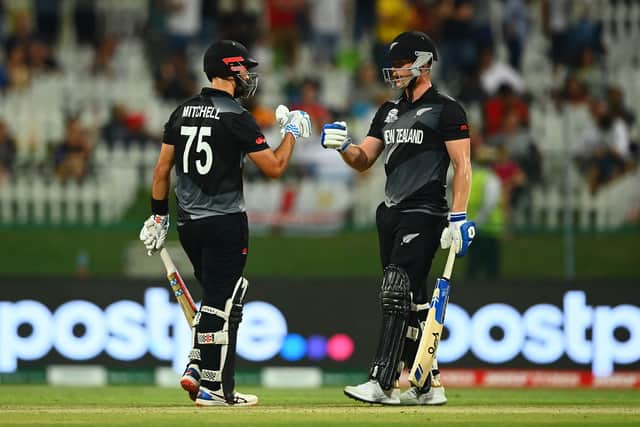

Thanks to Ali’s half century and Malan’s input, England scored 166-4.
New Zealand’s innings did not get off to the best start as batting star Martin Guptill was caught by Ali off Chris Woakes in the first over.
Advertisement
Hide AdAdvertisement
Hide AdWilliamson then fell shortly after to Woakes as well and England looked to be well set for making it to the final on Sunday. In came Daryl Mitchell and Conway who put in great scores for their nation but the run rate began to slow and England’s World Cup final hopes looked set.
Livingstone produced a terrific spell of two wickets within two overs taking out Conway and Glenn Philips.
But then in came Jimmy Neesham who’s impact completely revolutionised New Zealand’s game. His 27 off 11 balls was a match-winning cameo and Daryl Mitchell eventually brought his team home with a final four with an over left.
Can England improve their death bowling?
The absence of Tymal Mills may have felt more noticeable than that of Jason Roy in yesterday’s semi final. Mills has had a phenomenal record in this year’s T20 World Cup, especially considering his omission from the England squad for so many years.
Advertisement
Hide AdAdvertisement
Hide AdHis key moments came in the final overs of matches and was able to take late but crucial wickets, reducing the opposition’s chances of scoring runs.
Yesterday’s semi final was most definitely England’s until Chris Jordan bowled in the 17th over.
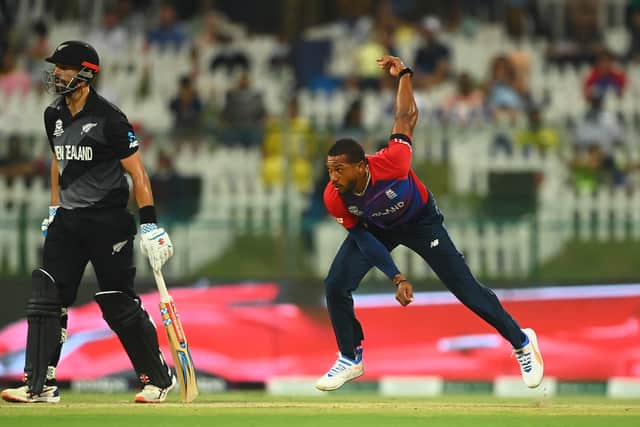

Jordan bowled either in the slot for the batsman or wide and Neesham was able to deliver for his country and the over went for 23 runs with England unable to regain the control they had earned from the previous 16 overs.
While Jordan has been considered a death-bowling specialist, the absence of both Jofra Archer and Mills meant England had no other alternatives and lost the game having been on the front foot for three quarters of the innings.
Advertisement
Hide AdAdvertisement
Hide AdSpeaking with Sky Sports, former England batsman Kevin Pieterson said that Mills was irreplaceable to England, not just because of his death-bowling skills, but because the opposition have not come up against him nearly as regularly as England’s other bowlers.
Can England rely on an opening partnership?
England have struggled with opening partnerships in all formats of cricket ever since Andrew Strauss and Alistair Cook left the pitch.
In 2019 it had seemed the white-ball had found their saviours as Jonny Bairstow and Jason Roy were able to take control of the opposition bowlers in the opening overs of most of the 50-over World Cup matches.
In 2021, we saw Jos Buttler take Bairstow’s opening spot with Roy. Individually, Buttler and Roy have produced some outstanding innings, most crucially Buttler’s 101 against Australia. However, it has often happened that when one batter falls, it cannot be long until there is another wicket or even a complete top-order collapse.
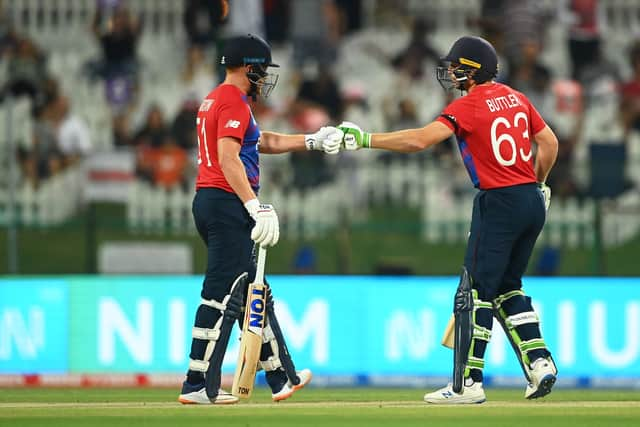

Advertisement
Hide AdAdvertisement
Hide AdButtler has been able to remain a constant for the majority of England matches, but there cannot be a usual complacency that is seen when the squad begin to rely on one or two players. It has been seen too many times, most significantly with Ben Stokes, when one saviour in the team can come in and restore all justice but England must learn to build up stability throughout the line up.
England must strengthen their partnerships between the top order batsmen if they are able to succeed against the likes of Mohammad Rizwan and Babar Azam or Rohit Sharma and KL Rahul.
Will England be able to remain consistent?
England fans have been used to extreme highs and lows when watching their cricketers play. While it is undoubtedly part of the game of cricket to experience such antipodes, consistency is key to England’s future success.
New Zealand have risen quietly but persistently through the ranks of world cricket and have consistently been a presence in World Cup finals and semi finals for decades. In 2016, they reached the semi finals of the T20 Cricket World Cup, in 2019 they famously made it to the final of the ODI World Cup and in 2021 they won the International Test Championship.
Advertisement
Hide AdAdvertisement
Hide AdWhile remaining a constant threat, opponents can quite easily be thumped by England one week and the next week come back to completely demolish the side for apparently no rhyme or reason.
England’s batting has been an area that has needed improvement in consistency for many years, most notably in the Test side, but in the T20 side as well. Buttler has carried at least two of England’s matches this World Cup, but then proved to be unable to continue his success through to the Semi finals while England’s bowling was inconsistent even within the parameters of one match.
Chris Jordan and Chris Woakes have been invaluable weapons in England’s armoury throughout the tournament, and have taken 13 wickets between them with Woakes being a phenomenal threat in the opening stages of a match and Jordan sustaining the momentum throughout the remaining overs.
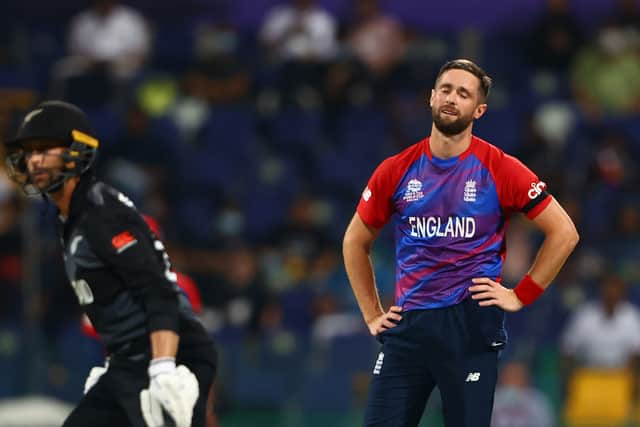

However they both fell short of requirements in their fixture against New Zealand, producing exceptionally expensive overs ultimately costing England the match.
Advertisement
Hide AdAdvertisement
Hide AdWhile England should be proud of the accomplishments they achieved as a team during the World Cup, especially ending the Super 12 stage as top of the group, there will much for Eoin Morgan, Chris Silverwood and the rest of the England camp to consider as they begin to prepare for their next T20 Campaign in Australia next October.
A message from the editor:
Thank you for reading. NationalWorld is a new national news brand, produced by a team of journalists, editors, video producers and designers who live and work across the UK. Find out more about who’s who in the team, and our editorial values. We want to start a community among our readers, so please follow us on Facebook, Twitter and Instagram, and keep the conversation going. You can also sign up to our newsletters and get a curated selection of our best reads to your inbox every day.
Comment Guidelines
National World encourages reader discussion on our stories. User feedback, insights and back-and-forth exchanges add a rich layer of context to reporting. Please review our Community Guidelines before commenting.
